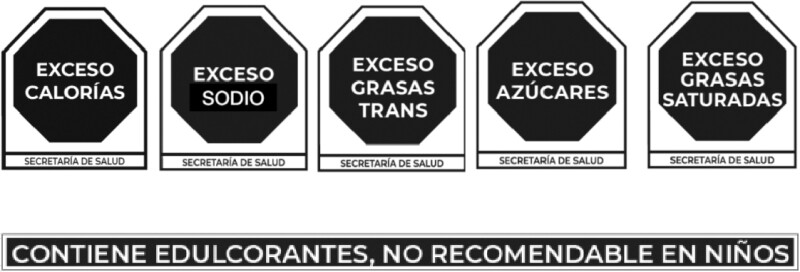Despite the COVID-19 pandemic, 2020 has been particularly active regarding amendments to the rules around trademarks and distinctive signs in Mexico. There has been a new regulation for the labelling of pre-packaged food and non-alcoholic beverages and a new Mexican Industrial Property Law.
These changes will enter into force soon and will directly have an impact on the use, prosecution and litigation of trademarks.
The main points of these amendments are detailed below.
Amendment regarding the Mexican Official Standard NOM-051
History
On March 27 2020, the amendment to the Mexican Official Standard NOM-051 (regulation on the general labelling specifications for pre-packaged food and non-alcoholic beverages) was published in the Federal Official Gazette.
Through the years, emblematic characters, drawings or logos were protected by IP owners to be used as the front image of their products, or to launch advertisement campaigns with celebrities, such as athletes or actors to promote their respective goods.
The amendment to this regulation stipulates that pre-packaged food and non-alcoholic beverages have a warning label system that provides better health and commercial information to consumers.
The reasons for such an amendment are due to the following facts:
Mexico faces a public health problem of overweightness and obesity.
Front labelling is proposed as a measure to protect and guarantee proper and responsible consumption of goods by Mexican citizens.
Mexico is one of the top countries for childhood obesity worldwide.
Warning labels
The warning label system consists of mandatory seals that should be included at the front of the package to inform consumers about whether the product they are choosing is high in calories, sugars, sodium, saturated fats and/or trans fats for example, or contains sweeteners.
Below, is an example of the warning octagonal black seals used to caution consumers that products contain an excess of the aforesaid components and to highlight any sweeteners in the product.

The obligation to use such warning seals on the front of packages of products will come into force on October 1 2020. Its implementation foresees a transition period which includes three phases which are increasingly stringent regarding the calculation and evaluation of the values and profiles concerning nutritional information.
To try to prevent further increases in child obesity, this new warning label system also seeks to protect children by prohibiting in the label or packages of products with one or more warning seals, the use of children's characters, animations, cartoons, celebrities, athletes or pets, interactive elements, such as visual-spatial games or digital downloads. This is to avoid children being encouraged to purchase or choose one of these products.
This last obligation is stated in Article 4.1.5 of the regulation which says the following:
4.1.5 Pre-packaged products bearing one or more warning stamps or the sweetener label must not:
a) include on the label children's characters, animations, cartoons, celebrities, athletes or pets, interactive elements, such as visual-spatial games or digital downloads, that, being directed to children, incite, promote or encourage the consumption, purchase or choice of products with excess critical nutrients or sweeteners, and
b) make reference on the label to elements other than the ones intended for the same purposes of the previous paragraph.
This specific obligation established in the above-mentioned article will come into force on April 1 2021.
Though the purpose of the regulation is to protect children, the measures established in it could be considered excessive, unnecessary and absolutely disproportionate, as child obesity is caused by multiple factors such as genetic heritage and susceptibility, lifestyle, globalising influence, cultural environment and socio-economic and educational conditions. It is not simply a consequence of the consumption of products which have high levels of critical nutrients or sweeteners.
Thus the restriction of using children's characters, animations, cartoons, celebrities, athletes or pets, interactive elements, such as visual-spatial games or digital downloads in products directed to children that bear one or more warning seals to discourage children from purchasing or choosing one of these products might not be the right solution to a disease which has multiple factors, like childhood obesity.
This prohibition affects companies when it comes to strategy planning for protection of IP rights, including marks, copyright or marketing or advertisement strategies regarding the use of their rights. Moreover, such a prohibition also affects regular contracts for exploiting the use of the image of a celebrity or athlete.
As a result, this amendment could be subject to legal procedures based on illegality and excessiveness. It clearly affects commerce and economic competition. Accordingly, it is important that IP owners design legal strategies to neutralise the negative impact that NOM-051 will produce in order to defend their rights.
New Mexican IP law
History
On July 1 2020, the new Federal Law for the Protection of Industrial Property (FLPIP) was published in the Mexican Official Gazette. This replaces the whole current IP law.
The Mexican Congress enacted this law to comply with the obligations that Mexico has undertaken in international treaties that were recently executed, such as the Comprehensive and Progressive Agreement for Trans-Pacific Partnership (CPTTP) and the United States-Mexico-Canada Agreement (USMCA) and is without doubt the most important legislative amendment in Mexico in years.
The main points of this new law regarding trademarks are below.
Trademark registration validation period
The 10-year validity period of a trademark will be counted from the granting date, instead of the filing date, as it was before. Nevertheless, the filing date will still determine the priority date for the applications.
Well-known and famous trademarks
The new law specifies that a trademark in Mexico can be declared famous when it is demonstrated that it is known by most of the consumer public in Mexico, or when it has sufficient diffusion or recognition in global commerce.
Some requirements to prove the well-known status or fame of a trademark were removed from the new law to facilitate the obtaining of such declarations.
Opposition
The new law states that the deadline for a third party to file an opposition against the registration of a trademark is one month counted from the publication of the application in the Official Gazette, whereas the deadline for the applicant to respond to the opposition brief will be two months, which can be automatically extended for another two months.
In the event of an unsuccessful opposition procedure, and once a trademark registration has been granted, if the opponent wishes to file an invalidation action against said registration, it is mandatory to not offer the same arguments or evidence in such an eventual action – otherwise, it will be dismissed.
In other words, in order for the opponent to file an invalidation action, it will be necessary to file new arguments and evidence, different from those offered during the opposition procedure, in order for the Trademark Office to examine the action.
Formal and substantive examination
The new law establishes that the Mexican Institute of Industrial Property (IMPI) will conduct formal and substantive examination together, and consequently the IMPI will issue only one official communication containing formal requirements and objections and/or objections and/or any oppositions filed by a third party.
Recordal of licences
The new law provides that it will not be necessary to file a recordal petition for a licence agreement for it to be effective against third parties.
Declaration of Use for the first three years for registrations granted before August 10 2018
The new law specifies and confirms that registrations granted before August 10 2018 are not subject to the filing of a Declaration of Use for the first three years.
Designation of Mexican agent
The new law specifies that if the holder of a registration does not appoint a Mexican agent, all notifications related to invalidation or cancellation actions connected to the registration will be made by publication in a Mexican newspaper and in the Mexican Official Gazette.
Invalidation actions
The new law establishes the possibility of obtaining partial invalidation of trademark registrations, in the following situations:
i) if the registration challenged is identical or confusingly similar to another that has been used in Mexico or abroad prior and uninterruptedly to the filing date of the registered trademark or prior to the date of first use declared in the trademark challenged and it was used to distinguish the same or similar products or services; or
ii) if the registration challenged was granted by error, mistake or difference of judgment by the IMPI, disregarding the existence of a prior identical or confusingly similar trademark application or registration that is considered affected and that covers the same or similar products or services.
The IMPI will declare the partial invalidation only in connection with the products or services protected by the trademark registration challenged.
The new law allows the cancellation of a trademark registration if the date of first use declared in the application of the registration challenged is false, and its holder cannot demonstrate its veracity. In this sense the burden of proof falls to the defendant
Moreover, the new law establishes the possibility of invalidating a trademark registration if the products or services are not offered free of deception or bad faith, and if they violate the applicable legal provisions in force.
Partial non-use cancellation actions
The new law establishes the possibility of partially cancelling a trademark registration if a specific product or service protected by the registration challenged is not in use.
Infringement action proceedings
The new law now allows conciliation proceedings, which may be requested by any of the parties at any procedural stage, as long as an infringement decision has not been issued.
It is important to note that the Trademark Office will not decide on the substance of the case, and the agreement resulting from the conciliation will end the infringement action proceeding. It will have the character of res judicata and will entail execution. Conciliation proceedings are only available in infringement proceedings, not cancellation proceedings.
|
|
The new law now allows conciliation proceedings which may be requested by any of the parties at any procedural stage, as long as an infringement decision has not been issued. |
|
|
The law now allows the holder of an affected right to claim damages through the following two independent actions:
i) before the IMPI after November 5 2021, by filing a parallel procedure (incidental), once the plaintiff obtains a favourable decision declaring infringement; or
ii) directly before the civil courts by filing a civil or mercantile lawsuit. In this scenario, the procedure may be suspended, in case the counterpart files as a counterclaim a cancellation or invalidation action against the plaintiff's registration, which will be solved by the IMPI.
The law establishes as a new cause of infringement the improper appropriation of information that is considered an industrial secret, without the consent of the person exercising legal control or its authorised user in order to obtain a competitive market advantage. Likewise, accessing an industrial secret kept in a computer system, without authorisation in order to cause damage or obtain an economic advantage for oneself or a third party has been added as a crime.
The fines for violating an IP right have considerably increased in the new law in comparison with the actual law, and the Trademark Office can impose a fine of up to 250,000 UMAS on an infringer. This amounts to $21,720,000 MXP (around $1,086,000.00 USD). The fines will be collected by and paid to the Trademark Office.
Counterfeits
The new law has defined a counterfeit as using an identical trademark or using it in a way that it cannot be distinguished in its essential aspects as it appears in the certificate of registration or in circumstances where there is a decision stating the well-known status or fame of a trademark.
Currently the Mexican authorities are working on the regulations of this new law, however, there is no issuance date available.
In order to clarify any doubts and have a proper understanding of the legal implications of such important amendments, it is advisable to contact an IP expert in Mexico.

Juan Carlos Amaro
Juan Carlos Amaro is a lawyer with a postgraduate degree in constitutional law and IP law from the Universidad Panamericana.
He joined BC&B in 2004 and became partner at the firm in 2010. He leads the IP litigation group, the trademark and copyright group and the corporate and commercial law group.
He has more than 50 years of experience and focuses his practice on IP and administrative litigation, anti-counterfeiting and constitutional law. He assists clients with their IP and commercial global strategies and has represented domestic and international clients in more than 500 litigation cases.












